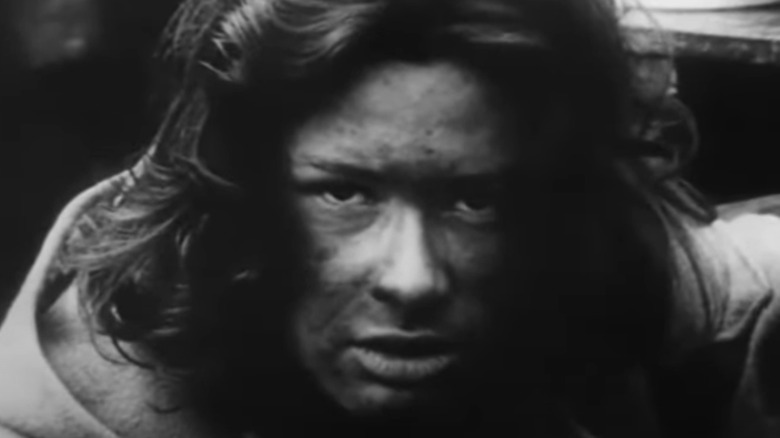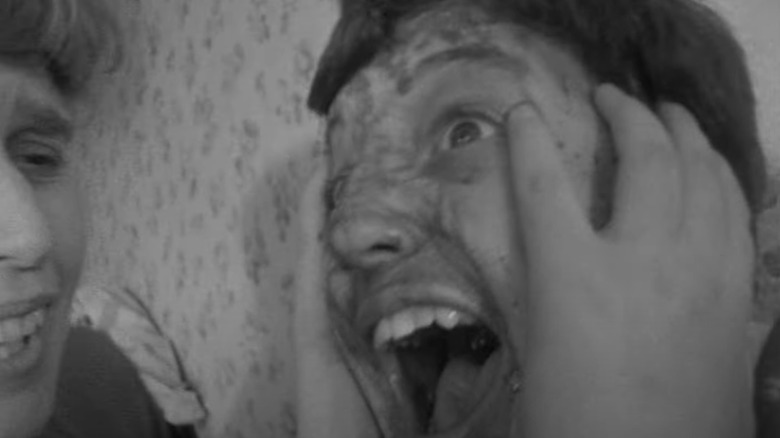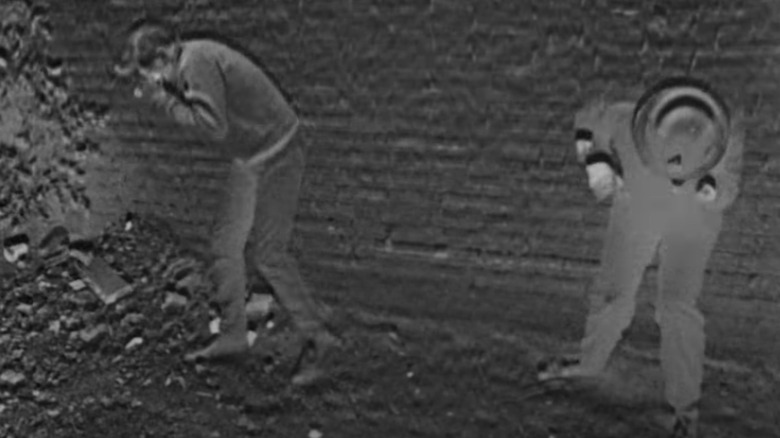The Horrific BBC Mockumentary Banned From TV By The UK Government
In a 1963 radio and TV address to the American People on the Nuclear Test Ban Treaty, President John F. Kennedy decried the way in which the advent of nuclear weapons had made it so that "all mankind has been struggling to escape from the darkening prospect of mass destruction on earth." The reality was arguably even more dismal. Rather than struggling to escape it, by that point humankind had already gotten used to pretending the looming threat of complete and utter annihilation simply wasn't there.
Ever since World War II, Britains in particular learned to live with the fact that, at any moment, disaster could strike. My nan used to tell me about riding her bike to school down the bucolic hills of East Sussex, only for fighter jets to strafe the nearby land. A quick duck and cover attempt under a bush later, she hopped back on her bike and pedaled her way to morning classes. In the years since, this bizarre and unsettling juxtaposition between quotidian middle English existence and ever-present catastrophe became even more intense, with the arrival of the thermonuclear state and what was euphemistically known as mutually assured destruction.
Of course, nobody can live day to day constantly fretting about the fact that, at any moment, they could be vaporized. So, people went about their business. In Britain, this can be seen in the infamously disturbing 1980s TV film, "Threads," the first half of which acts as a kitchen sink drama that faithfully portrays the everyday lives of Sheffieldians. In the latter half, however, the BBC film transmogrifies into one of the most harrowing depictions of nuclear attack and the ensuing fallout ever put to film. That contrast between the realistic humdrumery of British life and the truly nightmarish hellscape depicted in the second half jolted an entire nation out of their compartmentalized perception of the nuclear threat. Mutually assured destruction had, certainly by the 1980s, become as normal a part of life as afternoon tea. With "Threads," writer Barry Hines wanted to remind viewers what sort of a catastrophe they faced, and arguably succeeded since the air date became known as "the night the country didn't sleep."
Almost two decades prior, however, another BBC film attempted a similar feat, only to be withdrawn from public broadcast in a controversial move that looks to have involved the British government.
The War Game was a harrowing depiction of nuclear war
In 1966, the BBC commissioned a docudrama that would depict a nuclear attack on Britain. "The War Game" was written, directed, and produced by Peter Watkins and used a naturalistic style that was strikingly effective at portraying what an actual nuclear detonation might do to everyday Britons and their country. Beginning with escalating tensions between the U.S. and its Nato allies and the Soviets and China, the film depicts the Russians launching a one-megaton warhead which explodes near Kent. The film then showcases, in vivid detail, the suffering of those affected.
As a family prepares for the initial blast a voiceover announces, "This could be the way the last two minutes of peace in Britain would look." We then see the family weathering the initial heat wave as the announcer describes the grim scene. "At this distance," he says, "the heat wave is sufficient to cause melting of the upturned eyeball [and] third degree burning of the skin." Things only get more harrowing from there, as we see stacks of bodies being driven through devastated streets. Firing squads execute condemned men as closeups reveal the horrific injuries suffered by the masses. In a final scene, traumatized children are asked what they want to be when they grow up, only to remain silent or reply that they "don't want to be nothing."
As you can imagine, the BBC of the mid-60s wasn't too taken with Watkins' visceral docudrama. This was the same year that ITV began broadcasting the pure joy of Adam West's "Batman" series and the Beatles performed live on the BBC's "Top of the Pops" for the first time. As such, a withering portrayal of nuclear fallout wasn't exactly going to slot neatly into the schedule. Indeed, the BBC's decision to pull "The War Game" was, according to the broadcaster itself, motivated by the sheer horror of the thing. A Parliamentary transcript records the company's statement thusly:
"This is the BBC's own decision. It has been taken after a good deal of thought and discussion but not as a result of outside pressure of any kind [...] the effect of the film has been judged by the BBC to be too horrifying for the medium of broadcasting. It will, however, be shown to invited audiences, including those people who helped to make it."
In the years since, however, it has become clear that there was indeed significant outside pressure to withdraw "The War Game" from broadcast.
The controversial banning of The War Game
Between April 13 and May 3, 1966, "The War Game" was shown at the National Theatre in London before debuting in a handful of festivals. It even won the Academy Award for Best Documentary Feature the following year. But it wasn't shown on TV until July 31, 1985 — almost two decades after it was made... for TV. The ostensible reason for such a delay was that the BBC had deemed Peter Watkins' docudrama simply too upsetting for general audiences. But it seems there was more to it.
A 2016 study published in the Journal of British Cinema and Television (via Edinburgh University Press) describes an in-depth investigation into film's initial banning. Author John R. Cook noted how there had long been suspicions that the BBC made their decision to pull "The War Game" under pressure from the government of the time. The theory goes that authorities feared Watkins' docudrama might induce a sort of panic among the masses, and Cook tries to prove as much by looking at previously classified Cabinet Office papers, ultimately surmising that "TV censorship of 'The War Game' involved a complex interaction between civil servants in Whitehall, government ministers, including Prime Minister Harold Wilson himself, the Director-General of the BBC and the Chairman of the BBC Board of Governors." As such, Cook claims that "The War Game" and its controversial debut (or non-debut) "raises disturbing questions both about the limits of the BBC's professed liberalism of the 1960s and about the true extent of its much-vaunted independence from government." It should be noted, however, that the BBC maintained that while government officials were shown the film, their comments had nothing to do with the broadcaster's decision to pull "The War Game."
Much like "Threads," the apocalyptic nightmare that shook Britain to its core in the '80s, "The War Game" showed an unprecedented lack of restraint in its depiction of nuclear war. But that was the point. Watkins claimed to be concerned with "help[ing] people break the silence in the media on the nuclear arms race." In a larger sense, though, "The War Game" was an attempt to remind people of just what nuclear war meant. The thought of a world blackened by thermonuclear disaster resided in the back of an entire generation's collective consciousness, to the extent that it was at once an unthinkably terrifying prospect and almost a cliché, sapped of much of its actual meaning simply due to the fact it had loomed for so long. "The War Game" likely would have jolted everybody back to reality in a way that the BBC and the U.K. government evidently felt to be counterproductive.
To Watkins, merely showing the film to senior members of government already constituted a violation of the BBC's own Charter of Independence, and that's to say nothing of actually pulling the program from the schedule. Others, such as the University of Sussex's Dr. Alban Webb (via the BBC) argue that the BBC "saw itself as a custodian of the best interests of the nation, which in this case it judged to mean not panicking the public about the hopelessness of our survival in a nuclear war." If being the custodians of the nation's best interests means consulting the government on anything that might cause upset, however, you wonder why the broadcaster made so much of its "independence" in the first place.


